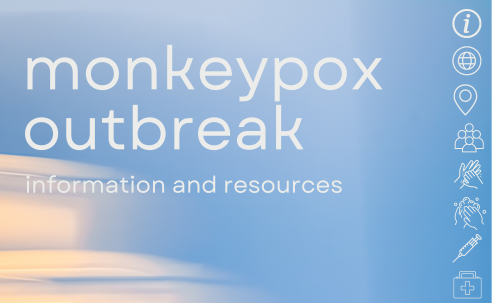Monkeypox Outbreak: Information and Resources
August 11, 2022
What is monkeypox, how does it spread, and how can you help prevent it?
All information adapted from CDC website unless otherwise noted.
Outbreak basics
- What is monkeypox?
- Part of the same family of viruses as variola virus, which causes smallpox
- Symptoms similar to smallpox but milder
- Rarely fatal
- Not an STI
- Case Count (as of 8/10/2022)
- New Hampshire: 15
- New England: 279
- United States: 10,392
Online Resources
- Center for Disease Control
- World Health Organization
- City of Portsmouth Health Department
- NH Department of Health & Human Services
- TellYourPartner.org
Local Contacts
If you suspect you may have monkeypox, immediately contact your doctor or other health professional for medical guidance.
- Dartmouth Health Monkeypox Hotline: 603-650-1818
- NH Department of Health & Human Services: 844-ASK-DHHS or 211 / monkeypox@dhhs.nh.gov
- Wentworth-Douglass Hospital: 603-742-5252
- Exeter Hospital: 603-778-7311
Risk Factors
- Monkeypox can be acquired by all people, regardless of gender, sexuality, race, or ethnicity
- The majority of known cases have been in men who have sex with men. This is thought to be because the current outbreak may have started at two European raves largely attended by this population*
- Symptoms usually start within 3 weeks of exposure
- Contagious from time symptoms start until rash has fully healed (may take several weeks)
*The Fenway Institute, “Monkeypox and gay and bisexual men: Fact sheet”, May 2022
Symptoms
- If infected, you may experience all or some symptoms
- Rash which may
- go through stages, including scabs
- look like pimples or blisters
- be painful or itchy
- Fever or chills
- Swollen lymph nodes
- Headache or muscle aches
- Exhaustion
- Respiratory issues (cough, sore throat, etc.)
Prevention
- When possible, avoid contact with:
- people who have a rash that looks like monkeypox
- objects/materials that a person with monkeypox has used
- Wash hands often or use alcohol-based hand sanitizer
- Visit the CDC website for advice on how to lower risk during sex or social gatherings
- Consider vaccination as it becomes more widely available
Vaccination
- Currently two live vaccines available: JYNNEOS and ACAM2000
- JYNNEOS is FDA-licensed, non-replicating, and has fewer side effects, but is in short supply
- NH DHHS is working with health care providers to allocate doses, prioritizing those with known exposure and including pre-exposure prevention access soon*
- Clinic locations, availability, and referral information will be on the NH DHHS website starting Monday, August 15th
*Adapted from NH DHHS "Monkeypox virus outbreak, update #3", 8/10/2022
Recovery
- If you suspect you have or have been exposed to monkeypox, try to self-isolate and contact a health professional for further guidance
- When isolating:
- Keep rash clean, dry, and uncovered
- Try not to itch
- Keep to a room with open windows
- Wash hands frequently
- Rest and stay hydrated
- Use medication for pain as needed
- Stay connected, do things you enjoy, and tend to your mental health
Adapted from World Health Organization, '"Recovering from monkeypox at home", 7/24/2022
Reflection
For further reading, check out these articles from TheBody: The HIV/AIDS Resource. Thank you Aids Response Seacoast for sharing these with us:
- Let's Set the Record Straight on Monkeypox, Gay Men, and HIV - Juan Michael Porter II, 6/13/22
- My Experience With Monkeypox, and What It Has Taught Me About Stigma - Charles Sanchez, 7/28/22
We as a community need to remember what we learned from HIV and COVID-19: that viruses don’t discriminate.
Charles Sanchez
